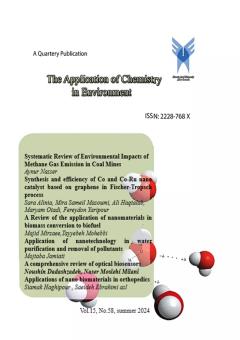Synthesis and efficiency of Co and Co-Ru nano catalyst based on graphene in Fischer-Tropsch process
Subject Areas : Chemistry and Chemical Engineering of all specializationsSara Alinia 1 , Miresmaeil Masumi 2 * , Ali Haqtalab 3 , Maryam Otadi 4 , Fereydon Yaripour 5
1 - Department of Chemical Engineering, Technical and Engineering Faculty, North Tehran Branch, Islamic Azad University, Tehran, Iran
2 - عضو هیات علمی دانشگاه آزاد اسلامی واحد تهران شمال گروه مهندسی شیمی
3 - Department of Chemical Engineering, Tarbiat Modares University, Tehran, Iran
4 - Department of Chemical Engineering, Technical and Engineering Faculty, Central Tehran Branch, Islamic Azad University, Tehran, Iran
5 - Catalytic Research Group, Petrochemical Research and Technology Company, National Petrochemical Industry Company, Tehran, Iran
Keywords: Fischer-Tropsch synthesis, cobalt catalyst, cobalt-ruthenium catalyst, graphene nanoplates, fixed bed reactor,
Abstract :
In this research, to improve the efficiency and environmental sustainability of the Fischer-Tropsch process, graphene nanosheets were used as a base for the synthesis of cobalt catalysts. These catalysts were prepared by wet inoculation method and their properties were investigated by various techniques such as FTIR, ICP, BET, XRD, EDX, TPR and TEM. The effect of changing the weight percentage of cobalt (from 10% to 30%) on the activity of the catalysts was studied. The results showed that the catalyst containing 30% cobalt has the highest activity. For further optimization, 1% by weight of ruthenium was added to this catalyst. The performance of these catalysts was investigated in a fixed bed reactor under 25 bar pressure and temperatures of 220 and 240 degrees Celsius with synthesis gas flow. The results indicate that the use of graphene nanosheets as a catalyst base, in addition to improving the efficiency of the process, leads to the reduction of pollutant emissions and the production of cleaner fuels. Laboratory data showed that these catalysts help to improve carbon monoxide conversion, methane selectivity and product distribution and can have positive environmental impacts.
1. Kazemnejad I, Feizbakhsh A, Niazi A, Tavasoli A. Highly dispersed cobalt Fischer–Tropsch synthesis catalysts supported on γ-Al2O3, CNTs, and graphene nanosheet using chemical vapor deposition. Int J Ind Chem. 2019;10(4):321–33.
2. Chernyak SA, Stolbov DN, Ivanov AS, Klokov S V., Egorova TB, Maslakov KI, et al. Effect of type and localization of nitrogen in graphene nanoflake support on structure and catalytic performance of Co-based Fischer-Tropsch catalysts. Catal Today. 2020;357(February 2019):193–202.
3. Chernyak SA, Stolbov DN, Maslakov KI, Kazantsev R V., Eliseev OL, Moskovskikh DO, et al. Graphene Nanoflake- and Carbon Nanotube-Supported Iron–Potassium 3D-Catalysts for Hydrocarbon Synthesis from Syngas. Nanomaterials. 2022;12(24).
4. Karimi S, Tavasoli A, Mortazavi Y, Karimi A. Cobalt supported on Graphene - A promising novel Fischer-Tropsch synthesis catalyst. Appl Catal A Gen. 2015;499:188–96.
5. Taghavi S, Asghari A, Tavasoli A. Enhancement of performance and stability of Graphene nano sheets supported cobalt catalyst in Fischer–Tropsch synthesis using Graphene functionalization. Chem Eng Res Des. 2017;119:198–208.
6. Li X, Lu L, Ru S, Eom J, Wang D, Samreen, et al. Nanoplastics induce more severe multigenerational life-history trait changes and metabolic responses in marine rotifer Brachionus plicatilis: Comparison with microplastics. J Hazard Mater. 2023;449(November 2022):131070.
7. Yentekakis I V., Panagiotopoulou P, Artemakis G. A review of recent efforts to promote dry reforming of methane (DRM) to syngas production via bimetallic catalyst formulations. Appl Catal B Environ. 2021;296(February):120210.
8. Vasseghian Y, Le VT, Joo SW, Dragoi EN, Kamyab H, Chelliapan S, et al. Spotlighting graphene-based catalysts for the mitigation of environmentally hazardous pollutants to cleaner production: A review. J Clean Prod. 2022;365(May).
9. Pereira Lopes R, Astruc D. Biochar as a support for nanocatalysts and other reagents: Recent advances and applications. Vol. 426, Coordination Chemistry Reviews. Elsevier B.V.; 2021. 213585 p.
10. Sasson Bitters J, He T, Nestler E, Senanayake SD, Chen JG, Zhang C. Utilizing bimetallic catalysts to mitigate coke formation in dry reforming of methane. J Energy Chem. 2022;68:124–42.
11. Yang X, Wang W, Wu L, Li X, Wang T, Liao S. Effect of confinement of TiO2 nanotubes over the Ru nanoparticles on Fischer-Tropsch synthesis. Appl Catal A Gen. 2016;526:45–52.
12. Ruiz ON, Brown NA, Shiral Fernando KA, Harruff-Miller BA, Gunasekera TS, Bunker CE. Graphene oxide-based nanofilters efficiently remove bacteria from fuel. Int Biodeterior Biodegrad. 2015;97:168–78.
13. Ma W, Jacobs G, Sparks DE, Todic B, Bukur DB, Davis BH. Quantitative comparison of iron and cobalt based catalysts for the Fischer-Tropsch synthesis under clean and poisoning conditions. Catal Today. 2020;343(April 2019):125–36.
14. Li F, Jiang X, Zhao J, Zhang S. Graphene oxide: A promising nanomaterial for energy and environmental applications. Nano Energy. 2015;16:488–515.
15. Zhang F, Li YH, Qi MY, Yamada YMA, Anpo M, Tang ZR, et al. Photothermal catalytic CO2 reduction over nanomaterials. Chem Catal. 2021;1(2):272–97.
16. Wolf M, Fischer N, Claeys M. Formation of metal-support compounds in cobalt-based Fischer-Tropsch synthesis: A review. Chem Catal. 2021;1(5):1014–41.
17. Ghogia AC, Nzihou A, Serp P, Soulantica K, Pham Minh D. Cobalt catalysts on carbon-based materials for Fischer-Tropsch synthesis: a review. Appl Catal A Gen. 2021;609(October 2020):117906.
18. Navalon S, Dhakshinamoorthy A, Alvaro M, Garcia H. Metal nanoparticles supported on two-dimensional graphenes as heterogeneous catalysts. Coord Chem Rev. 2016;312:99–148.

